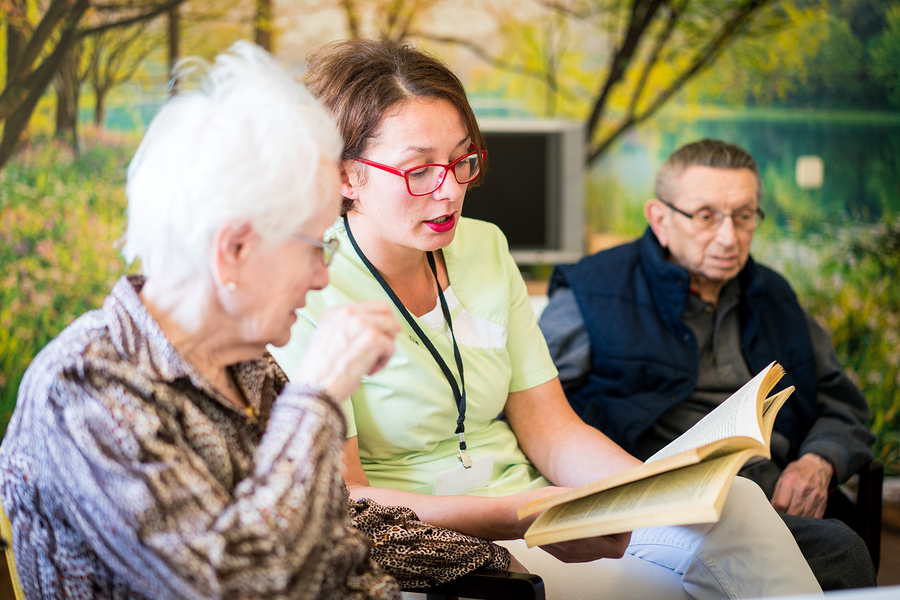Cognitive Stimulation Therapy (CST) is a small group program designed to improve the mental abilities, learning, thinking and memory skills of people living with Alzheimer’s Disease and Vascular dementia, the two main types of dementia. An evidence-based treatment backed by extensive clinical research, CST has been shown effective for individuals with mild to moderate dementia. Studies also indicate that CST can be as beneficial as drug treatments and may even enhance treatment for those who require medication management of symptoms.
Components of a CST Program
A CST program is facilitated by a trained healthcare professional over a period of at least seven weeks. Each 45-minute session covers a different themed topic with activities pertinent to quality of life enhancement, social interaction, mental stimulation, visual and auditory stimulation, communication skills, and physical mobility. Groups are limited to 5-8 people. Topics typically covered in CST are:
- orientation to surroundings
- face/ scene recognition
- art, music and culture
- current affairs
- use of money
- personal treasures
- object categorization
- creative expression
- childhood recollections
- word and number association
Benefits of CST
Consistent evidence from multiple and varied studies demonstrate that CST is effective in improving several types of symptoms associated with dementia. This includes improvement in mood, confidence, concentration, information retention, self-expression, and motivation. Participants and their caregivers report enhancements in self-esteem, coping methods, developing new relationships, and maintaining a sense of vitality. Research also shows CST is a cost-effective program as it helps reduce the total care costs (health and social) for those who participate. Long-term involvement (additional 24 weeks) brings about continued improvement in cognition and quality of life for many people.
To find a CST program, ask your physician and check with local hospitals, senior centers, and assisted living facilities.
References
- Cove, Jennifer et al. “Effectiveness of Weekly Cognitive Stimulation Therapy for People with Dementia and the Additional Impact of Enhancing Cognitive Stimulation Therapy with a Carer Training Program.” Clinical Interventions in Aging 9 (2014): 2143–2150. PMC. Accessed: 8 Apr. 2018: https://www.dovepress.com/effectiveness-of-weekly-cognitive-stimulation-therapy-for-people-with–peer-reviewed-article-CIA
- Spector, A. Thorgrimsen, L., Woods, B. Royan, L., et al., “Efficacy of an evidence-based cognitive stimulation therapy programme for people with dementia” (RCT) British Jl Psychiatry (2003), 183L248-254. Print.
- Woods, B. Aguirre, E. Et al., “Can cognitive stimulation benefit people with dementia?” posted 15 Feb 2012. Accessed 9 Apr 2018: http://www.cochrane.org/CD005562/DEMENTIA_can-cognitive-stimulation-benefit-people-with-dementia CSTdementia.com http://www.cstdementia.com
- Matsuda, O., “Cognitive stimulation therapy for Alzheimer’s disease: The effect of cognitive stimulation therapy on the progression of mild Alzheimer’s disease in patients treated with donepezil.” International Psychogeriatrics, (2007) 19(2), 241-252. doi:10.1017/S1041610206004194 Accessed 9 Apr 2018: https://www.cambridge.org/core/journals/international-psychogeriatrics/article/cognitive-stimulation-therapy-for-alzheimers-disease-the-effect-of-cognitive-stimulation-therapy-on-the-progression-of-mild-alzheimers-disease-in-patients-treated-with-donepezil/CCE296F93DD3A1C910BDF3BA874094A6
- Lundy, J. “CST: Making a difference for People with Dementia.” Power Point Presentation. Accessed 9 Apr 2018: http://semo.edu/pdf/HHS-CSTPPT.pdf
- MODEM-Dementia Interventions. “Cognitive Stimulation Therapy” https://toolkit.modem-dementia.org.uk/wp-content/uploads/2016/04/CST-Intervention-Summary.pdf
- Unforgettable.org “The facts about Cognitive Stimulation Therapy” Accessed 9 Apr 2018: https://www.unforgettable.org/blog/what-is-cognitive-stimulation-therapy/

